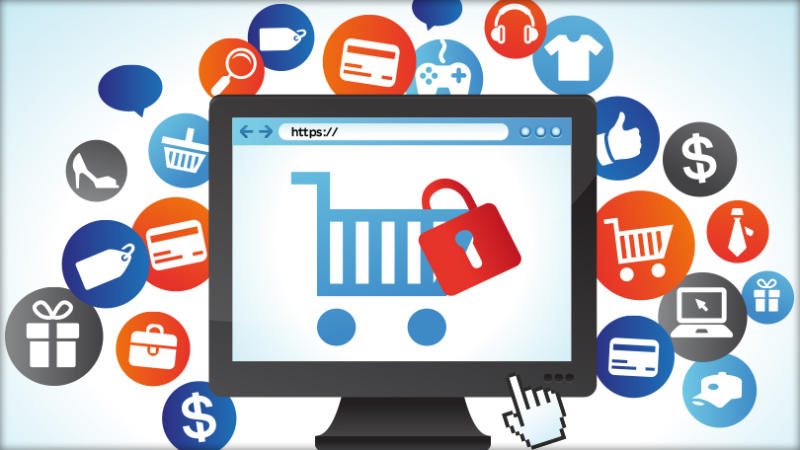
The holiday shopping season is just around the corner, which means a significant increase in online transactions and scammers gearing up to take advantage of them.
While your personal data may be compromised after the Optus cyber breach – and even if you weren’t a victim of this attack – we encourage you to take those extra measures to stay safe while shopping Black Friday – Cyber Monday bargains and other seasonal promos.
1. Before you shop, make sure the device you’re using is updated
Keeping old softwares in the devices you’re using to shop – computer, smartphone or tablet – presents a vulnerability that hackers can take advantage of.
Installing new updates place patches for known data security vulnerabilities. Sparing a few minutes to run an update on your devices before getting your shopping started will definitely pay off!
2. Don’t enter websites from links provided in promotional emails or SMS
According to the Better Business Bureau, ’57 % of shoppers do not research a new website before buying. And, of those 57 percent, 81 percent lost money’.
There is a spike in phishing scams during this time of year, which means there’s a higher chance you could be clicking on an email or SMS link to a malicious site that can start an auto download of malware. In order to stay safe when receiving a promotional SMS or email, we encourage you to take an extra step and enter the seller’s site URL in a new browser window.
As a simple guideline, always be careful with emails that follow the patterns below:
- Contain an offer that seems too good to be true
- Contain misspelt words
- Are sent from email addresses that don’t completely add up
- Contain a hyperlinked call to action that suggests an urgent need to “Act fast!”
3. Consider adding the DuckDuckGo extension to your Internet Browser and downloading the app on your smartphone.
As their privacy policy states, “DuckDuckGo doesn’t collect or share any of your personal information”. This search engine has been developed so you can search privately and skip the filter of personalised search by verifying websites security and blocking Google’s (and many other companies’) trackers. This will keep your information secured, and will prevent you from clicking on fake websites or malicious links.
4. When possible, avoid paying with your credit/debit card
Paying with secure online payment systems like Paypal, Google Pay, Apple Pay, Samsung Pay, etc., will give you an extra level of security and fraud prevention. These payment systems are affiliated with certified sellers only, and by using them you’ll eliminate the need to provide your payment card details directly to the merchant.
5. Delete any saved payment card details after completing a purchase
Many websites that require creating an account to complete an order automatically save your payment details, meaning that if a hacker gains access to your account, they can make purchases. After completing an online purchase, delete your payment card details immediately. Hackers can log into your account if you lose a device or if any of the information the retailer stores gets stolen.
6. Only shop at trusted websites
Always make sure the website URL starts with “HTTPS”, which means the website is safe. HTTPS means that data transmitted through the website such as your personal details and payment information is encrypted.
7. Never shop online when connected to a public Wi-Fi network
When connected to a public wi-fi network, there’s a chance a hacker may be spying on the activities being carried on your device when connected to the same public hotspot – including accesing your login details and payment information. You’re much safer to shop online using your own mobile data service.
8. Keep an extra eye for copycat sites and hackers impersonating real brands
Hackers buy domains that are very close to the real ones of popular retailers with small, easy-to-miss differences. Under these domains they create copycat sites designed to fool users that make a mistake when typing the URL, and sometimes use paid search-engine tools to place them at the top of your search results. These domains can also be used by hackers to impersonate brands via SMS and email promotions that look almost identical to the retailer’s. Be aware that during the holiday shopping season phishing emails and SMS like these are likely to land in your inbox more frequently.
9. Enable Banking Alerts & check transactions on your bank account regularly
It’s always handy to keep track of the transactions on your bank accounts and look for any charges that looks suspicious. Staying on top of the charges applied to your account gets easier when setting up banking alerts via email, SMS or online banking notifications. This will allow you to take action immediately if you’ve been a victim of fraud through an online shopping scam, or if a hacker has gained acces to your payment details.
10. Strengthen the security of your devices and login credentials
Make sure to add passwords to your devices and secure your online shopping, email and bank accounts by using password managers and setting multi-factor authentication (MFA). It is possible for hackers to find your correct password with the help of automated tools, and it gets quite easy for them to do so if the strength of your passwords is weak. Always use long passwords that include symbols and numbers, capital and lower case letters, and exclude obvious words or number series.
RESOURCES
10 Best Password Managers for Australia
Get the DuckDuckGo browser extension and mobile app here
7 ways to spot a copycat website
SOURCES
https://woz-u.com/ – (https://woz-u.com/blog/10-safety-tips-for-online-holiday-shopping/)
https://thetechnologypress.com/ (https://thetechnologypress.com/9-urgent-security-tips-for-online-holiday-shopping/)
